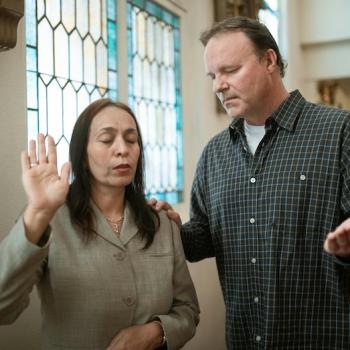Lectionary Reflections
Jeremiah 29:1, 4-7
October 13, 2013
This Sunday we return to the prophet, Jeremiah, and to a text that has brought significant commentary. It describes a letter that Jeremiah wrote to those who had just been exiled into Babylon in the year 587 B.C.E. The letter is addressed primarily to a list of the power brokers of Judah and Jerusalem whose power has now been swallowed up into the hungry maw of the world's greatest and most populous city. This vast metropolis features a 25-story tower, Eti-men-anki ('mountain of god') at the top of which resides the huge statue of the city god, Marduk, along with the fabled hanging gardens of Babylon, one of the seven wonders of the ancient world, a second story garden of parks and trees, gracing the palace of the king. One can only imagine the wonder with which these rubes from a tiny Jerusalem saw all these sights.
And the leaders of Judah included: King Jeconiah, the queen mother, court officials, various other high mucky-mucks from the court, along with the favored court artists and workers of metal (Jer. 29:2). The letter from the prophet is hand delivered by Elasah, Shaphan's son, and Gemariah, Hilkiah's son, both of whom the last king of Judah, Zedekiah (himself blinded and in exile in the city) had sent to Babylon sometime earlier than Jerusalem's fall. These two messengers clearly knew the city and could be trusted to carry the prophet's letter to the right people; perhaps they were proficient in the language of Babylon and thus able to get the note into the ghetto of Tel-Abib where the Judeans eventually were to live.
The letter contains remarkable and important demands from the prophet. We need to remember that Jeremiah has been prophet for over forty years by the time of his letter, and that many of those years have been given over to his warning that YHWH is furious with Judah, due to their heedless lack of concern for the poor, the widow, the orphan, the sojourners, all those who found themselves on the margins of Judah. These were thus fully dependent on the concern of followers of YHWH who were commanded again and again for centuries that concern for the marginalized was the determining reality for any nation that would claim to be great. Judah had failed at this task, and Jeremiah had said that exile and destruction were in their future. He was right, as events had proven.
So now the questions were: how long was this humiliating exile to continue and what are we to do, trapped as we are in a heathenish city, characterized by customs and practices that are both repulsive to us and just as surely repulsive to YHWH? Certainly the prophet will say to us that we must not give in to them, that we must keep ourselves free from their pagan taint, that we must worship YHWH alone and avoid these disgusting Babylonians in all things! The letter from the prophet comes as a shocking surprise. It begins with a very formal announcement that its words are straight from the mighty YHWH. "Thus says YHWH of the armies, the God of Israel, to all the exiles whom I have sent into exile from Jerusalem to Babylon." Make no mistake, says the prophet. You are in Babylon because YHWH has sent you there; this was no accident, no simple result of the weakness of your army as opposed to the strength of the army of Nebuchadnezzar. In reality, geo-politics and military prowess had nothing to do with your exile.
Some who received this letter would certainly have agreed with Jeremiah; YHWH was obviously involved in our defeat and exile just as YHWH is involved in all the actions of the world, but that is finally not our concern. We are now in exile, and the reasons for it say little or nothing about what we are now to do and how long we can expect to do it. It is perhaps very possible that some of the exiles remember the scene recounted in Jeremiah 28 where Jeremiah and another prophet, Hananiah, engaged in a preach-off of sorts. Hananiah had claimed that exile would come but it would be brief and less than onerous, while Jeremiah had completely disagreed, shouting that the exile will come and be long and difficult; he attacked Hananiah's sermon as empty and false, too much like former prophets who had cried out that peace was coming when there was in fact no peace to be seen (Jer. 28:8-9). As a result of his fallacious claims, Jeremiah predicts that prophet's death, and within the year Hananiah is dead (Jer. 28:17). Yet it was probably true that some who received the prophet's letter still hoped that this Babylonian sojourn would be brief and that return to Jerusalem was blessedly close.
The letter is for them a jolt. "Build houses and live in them; plant gardens and eat their produce" (Jer. 29:5). House building and agricultural concerns suggest a lengthy sojourn, a settled life in a foreign land. Well, they may have thought, we do need to live, but we can still keep our unique Israelite ways, living in our Israelite houses, eating our beloved Israelite produce from our wonderful Israelite gardens. Given all that, we will still maintain with strictness our Israelite ways. But the next sentence calls all that into question. "Take wives, have sons and daughters; then take wives for your sons and give your daughters in marriage, that they may bear sons and daughters; multiply there (in exile), do not decrease" (Jer. 29:6). This answers the question: how long? Long enough to marry, have children and grandchildren, at least three generations, with the implication of even more. And then there is the sticky question of where these wives and husbands are to come from. Does Jeremiah imply that intermarriage with the locals may be a possibility or perhaps even a necessity in order to keep the community alive and vibrant? The next sentence may certainly imply that possibility.




